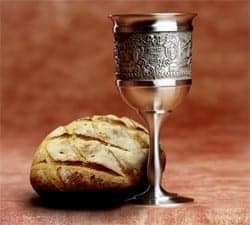When Christians come to this Table, in faith they are partaking of the very same thing that the Jews partook of in the Passover meal. We are taught explicitly that Christ was the Passover Lamb, slain for us. He was executed on the cross at the same time as Passover. The blood of the lambs was sprinkled on the wood of Israelite doorways just as the blood of Jesus was smeared on the wooden cross— which is why the cross of Jesus Christ is for us the only doorway through which we may escape the wrath of God. And when Jesus instituted the Lord’s Supper among His followers, which we are faithfully observing to this day, He instituted it at a Passover meal with His disciples.
Old Testament believers partook of the altar, looking forward in faith to the time when all the sacrifices of the Old Testament economy would be completed and fulfilled. They were looking forward to Christ, partaking of Him by faith. We are looking backward to the once-for-all sacrifice that Christ offered, and we are partaking of the same Christ.
Now the death of Jesus on the cross was the hinge upon which all of world history turns. There has never been a more completed event. If the Lord Jesus cries out it is finished, then as believers we must treat it as finished. The propitiatory sacrifice is over and done. Once for all, Christ died for sinners.
That aspect of the sacrifice is not being repeated here, nor could it be. What we are doing here is remembering and rejoicing. This is a eucharistic sacrifice, not a blood sacrifice. Because of the once-for-all blood sacrifice, we have been brought near so that we are united with Christ. United with Him, we partake of Him, and we do so as a forgiven and cleansed people. That is the foundation of our joy.
So come, and welcome, to Jesus Christ.


Beats me. I’ll go check.
There’s one major difference between the Passover and the Lord’s Supper, or more correctly, an advance. Communion was taken *after* the Passover meal, which in the economy of God was the last Passover ever. Those who partook in this after-meal, newly established, identified themselves with Jesus, declaring themselves to be sacrificial lambs just like Him. The presentation of His blood in heaven, and the sending of His Spirit to earth, made human sacrifice (as martyrdom) acceptable to God, with animal substitutes no longer needed. This is what the book of Revelation is all about: those who partook in the flesh… Read more »
Sincere question:
I hear people preach “It is finished” on Friday and in the next breath ask if the story ends there…of course Resurrection is critically important.
Why such an emphasis on “it is finished” when that’s not the end?
the Greek word translated “it is finished” is tetelestai, an accounting term that means “paid in full.” When Jesus uttered those words, He was declaring the debt owed to His Father was wiped away completely and forever. Not that Jesus wiped away any debt that He owed to the Father; rather, Jesus eliminated the debt owed by mankind—the debt of sin.
from gotquestions.org